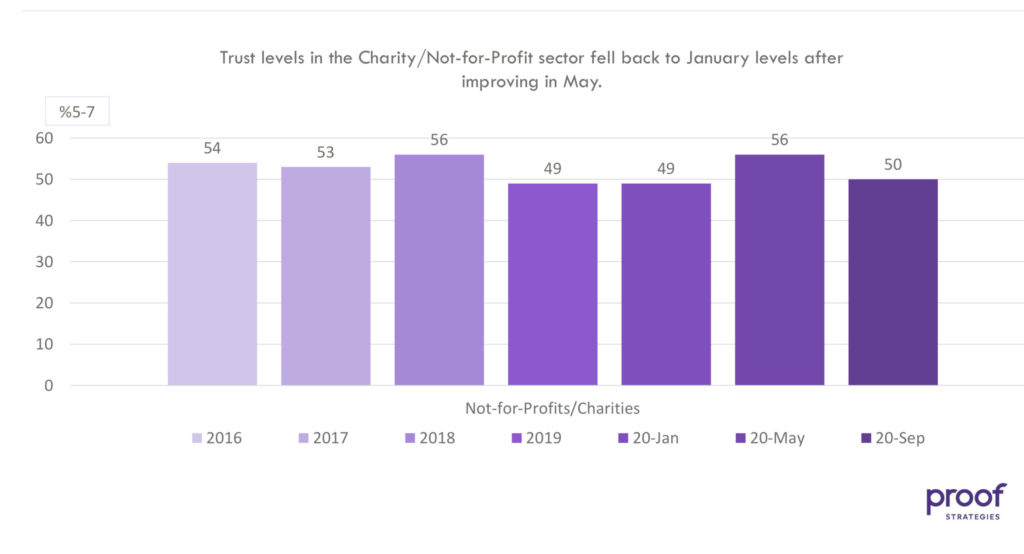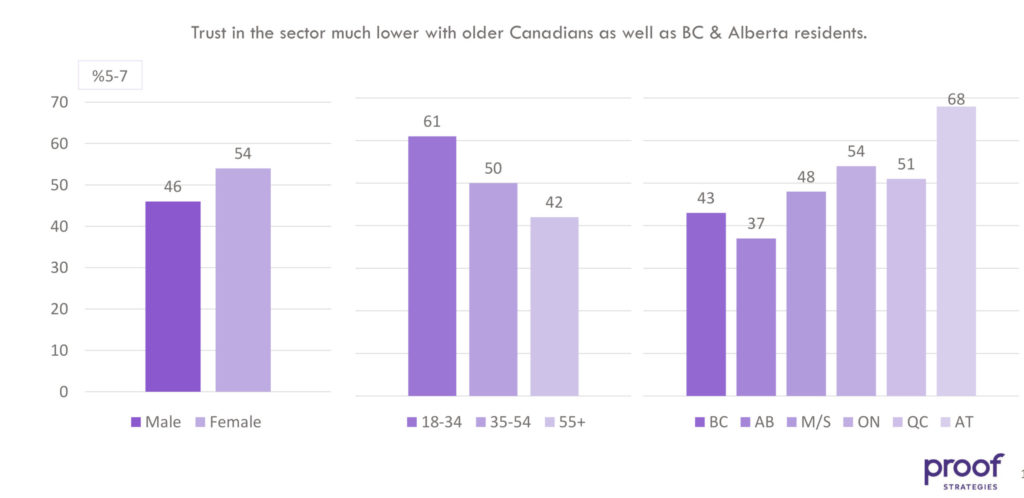
(September 9, 2020) Canadians’ trust in charities and the not-for-profit sector has fallen 6% to 50% overall, after climbing by 7% in May, according to the latest CanTrust Index released on September 8 by Proof Strategies.
Proof Strategies surveyed 1,000 Canadians between September 3 and 5 for the CanTrust Index COVID-19 Impact Update.
This sector decline is likely connected to Parliamentary Committees investigating Ottawa’s relationship with the WE Charity, a controversy that has dogged the prime minister since June according to the study.
“When the pandemic first hit, we saw a spike in trust in charities as they mounted a response to help people in need,” says Bruce MacLellan, President & CEO of Proof Inc. “Now, only four months later that spike is gone and the main charitable narrative in that time has been the ongoing WE story in Ottawa. It seems too much to be a coincidence.”
The Kielberger effect has also hit the prime minister hard.
The study indicates that although the Prime Minister received credit for working closely with public health and medical advisors, he has experienced a decline in trust, likely due to parallel events with the WE Charity.”
According to the survey, the trust in the PM has fallen since January from 39% to 32%, with the largest declines happening in Ontario and Quebec.”
The decrease in trust of charities and nonprofits is not new, however, and the trust level has been trending down since 2016.

Trust in charities is even lower at 42% per cent with people age 55+, according to the study, a cohort often seen at the backbone of fundraising programs, and the older you get the more likely you are not to trust charities. The provinces of BC and Alberta show the lowest trust in charities with 43% and 37% respectively.

“The WE Charity scandal is not over and there may be further erosion in the public’s trust in charities and non-profits,” says charity law specialist Mark Blumberg, “and as I’ve written in my blog on September 4, it may take a while to see the full impact of the scandal.”
“We know that the structures and governance of WE Charity and associated organizations had flaws,” says Hilary Pearson, former CEO of Philanthropic Foundations Canada. “But … countless other charities in Canada govern and manage themselves to a higher standard than this.”
“Since charities critically depend on the trust of donors, any decrease in trust is worrisome,” says Paula Attfield, chair of AFP Canada, a member-based association of fundraising professionals.
“We can’t know that the decline is related to the WE situation. Since trust rose at the beginning of the pandemic, perhaps it is simply returning to normal levels as the pandemic drags on. We do know that Canadians have historically continued to be strong supporters of the charities they care about, especially in challenging times.
“The WE situation is not representative of charities,” says Pearson. “In my view, public trust in charities will not erode if the charitable sector demonstrates responsible and transparent governance practice.”
“Trust in the non-profit and charity sector is not static,” says Blumberg. “Actions can be taken to improve the public’s understanding of the voluntary sector, increase transparency and accountability and trust.”
Other findings in the CanTrust Index include:
- Large corporate CEOs trust levels soften with a 4 point decline since May’s already relatively low score of 30. Trust in leaders of smaller or medium size businesses improved by 5 points in that same period.
- Doctors and scientists remain on top of the trust spectrum among Canadians with both in the top of all groups measured in September, scoring 83 and 77 respectively in September.
- News Media trust ratings are well below prior years, scoring lowest among younger Canadians, men and people who live in Alberta.
- Law enforcement groups have held their trust levels since January, but trust is much lower among younger Canadians